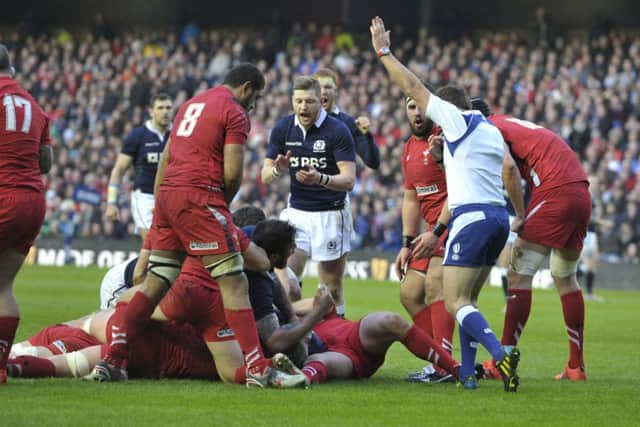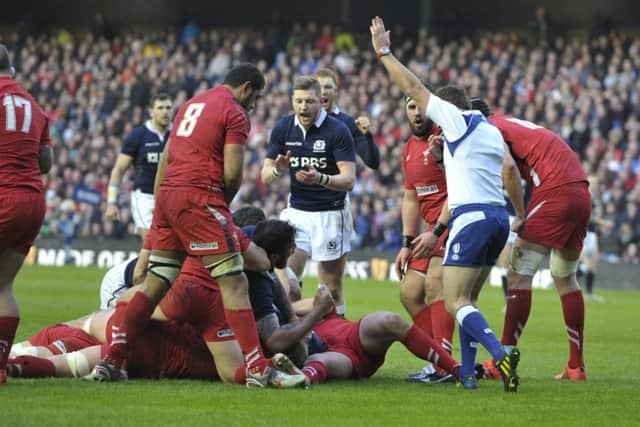Stuart Bathgate: Time to learn stoppage rules


Instead, he consulted his assistant George Clancy, agreed that time was up, and blew his whistle to end the game with Wales 26-23 ahead. Home supporters in the crowd at BT Murrayfield booed, and some Scotland players appeared baffled by Jackson’s decision.
Six seconds were left according to the official RBS Six Nations Championship data package supplied by Accenture. Some TV viewers reckoned there were five seconds left, while in the press conference after the match the consensus was that four seconds remained. But the precise amount of time is irrelevant. The referee is the final arbiter of timing in a rugby match, including when the clock should be stopped or started, and there is no obligation to restart a match after a late conversion.
Advertisement
Hide AdAdvertisement
Hide AdIn practice, the Television Match Official (TMO) controls the time, and the clock seen on TV is the one run by the TMO. The clock displayed inside the stadium is controlled by a separate individual, and, while every effort is made to keep that clock in synch with the TMO’s timing, variations of a few seconds can occur.


On Sunday there was no discrepancy between the stadium clock and the TV clock, but the crucial point remains: those clocks are guides for spectators, not determinants of the referee’s actions. This is rugby, not basketball or American football.
“The referee is in charge of the time, including such matters as when the clock is stopped,” as a spokesperson for Scottish Rugby said yesterday. “The TMO controls the time, including the time shown on TV.
“At the end of the match, the referee asks the TMO if there is any time left. There is nothing in the laws to say that play must restart after a conversion. It is up to the referee to decide if there is sufficient time to restart the game.”
The one minor difference from usual practice on Sunday was that the referee was not heard to ask TMO Simon McDowell if time had elapsed, which may have been because of a temporary breakdown in communication. By asking Clancy for a second opinion, Jackson followed prescribed practice in such situations.
The laws of the sport are complex, and every year World Rugby, the global governing body formerly known as the International Rugby Board, publishes “clarifications” in response to questions submitted by individual countries on particularly vexed matters. There is no specific mention in the 17 laws of the specific circumstances which arose on Sunday, with the closest relevant passages coming in Law Five, Time. Clause e) of that law states:
“If time expires and the ball is not dead, or an awarded scrum or lineout has not been completed, the referee allows play to continue until the next time that the ball becomes dead. The ball becomes dead when the referee would have awarded a scrum, lineout, an option to the non-infringing team, drop-out or after a conversion or successful penalty kick at goal. If a scrum has to be reset, the scrum has not been completed. If time expires and a mark, free kick or penalty kick is then awarded, the referee allows play to continue.”
On Sunday, the ball became dead after the conversion, and remained dead when those few seconds had passed and the 80 minutes were up. Wales would have restarted with a drop-out from halfway.
Advertisement
Hide AdAdvertisement
Hide AdA spokesperson for World Rugby declined to comment on the specific events of Sunday as the organisation had yet to complete its review of the weekend’s three matches, but did confirm that Law Seven dealt with the situation. “At this stage, full reviews of the match officials’ performances from the weekend are ongoing so I cannot comment specifically,” he said. “However, you are referring to the correct law regarding time so, with time having elapsed before the restart could take place, the referee (having consulted with the time-keeper) ruled that it was the end of the game. Time does not normally stop after a conversion (unless for an injury, substitution etc).”
As the ultimate authority, the referee could of course have added stoppage time at the end of the match if he had thought the restart had been prevented from taking place within the 80 minutes because of Welsh delays. If a Welsh player had indulged in foul play to delay a restart, Jackson could have awarded a penalty against him, to be taken from the halfway line.
Such an award can also be given if an act of foul play is committed by the defence in an unsuccessful attempt to prevent a try being scored. In that case the conversion would be attempted, and then followed by the penalty.
In practice, referees often discard the penalty option and simply award the try, but in 2003 Edinburgh won a memorable victory against Leinster in Dublin when the home team’s David Quinlan was red-carded for an offence off the ball as Craig Joiner went over for a try. Brendan Laney first converted that score and then added the three-point penalty.
More straightforwardly, two other events might have given Scotland more time in that final minute against Wales. If Jim Hamilton had avoided becoming imbroiled in a fracas on the ground just after Jon Welsh had touched down, there would have been an extra 20 seconds or so in which to restart the game. Something similar would also have been the case if Finn Russell had decided he did not want to attempt the conversion. In that latter case, Scotland would have been five points behind with one play to go, so they would have needed a converted try to win. But at least they would have had that chance to claim victory – something they were denied by the referee’s very precise timekeeping.